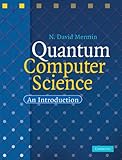Found in 2 comments on Hacker News
diegoperini · 2017-06-02
· Original
thread
A good recommendation for the quantum computing enthusiast:
https://www.amazon.com/Quantum-Computer-Science-David-Mermin...


How I learned:
I started out like you, in possession of an undergraduate education in computer science. I began reading Quantum Computer Science: An Introduction[0] by N. David Mermin. This is a very good textbook, but I absolutely could not skim it. I had to ensure I understood every single line before moving onto the next. I had the impression I wasn't learning very quickly, when in fact (due to the textbook's density) I was taking in a huge amount of information.
After a few weeks with the Mermin textbook, I bought Quantum Computing for Computer Scientists[1] by Yanofsky & Mannucci. This is a much softer introduction than Mermin, almost too soft: I skipped the first few chapters on linear algebra and complex numbers. However, in combination with the Mermin textbook, I acquired a good understanding of quantum computing basics. It was at this point I reached my own personal threshold for feeling I "understood" quantum computing.
People often recommend Quantum Computation and Quantum Information by Nielsen & Chuang (also called "Mike & Ike") for beginners. I believe this is not good advice. Had I tried to learn from that textbook, I would have failed. However, it is an excellent textbook after you already understand the basics. Anecdotally, I knew two people who tried to learn quantum computing at the same time as me: one used Mike & Ike, and the other used a book called Quantum Computing: A Gentle Introduction. Neither of those people understand quantum computing today.
How I wish I had learned:
My experience learning quantum computing required a huge amount of mental effort, and in the end what I learned wasn't actually complicated! So, I created a lecture called Quantum Computing for Computer Scientists[2] which is the lecture I wish I'd had access to before trying to read any textbooks. The lecture is popular and well-received, and I think it covers all the stuff that's really conceptually tricky; once you're over those conceptual hurdles, you can apply your regular computer science skills to learn everything else about quantum computing you need (how specific algorithms work, etc.) Thus my "hindsight" study guide is as follows:
1. Watch the lecture I created.
2. Watch Professor Umesh Vazirani's lectures on quantum computing; they flesh out my lecture and he is a tremendously effective explainer of concepts (these are scattered around YouTube but you can find a full playlist at [3])
3. Concurrently, work through the first few chapters of either the Mermin or Yanofsky textbooks
4. After you feel you understand the quantum computing basics, pick topics which interest you from the Nielsen & Chuang textbook
5. Stick around quantumcomputing.stackexchange, reading questions & answers, asking your own, and maybe eventually answering your own!
Good luck!
P.S. I've also heard good things about the Quantum Katas: https://docs.microsoft.com/en-us/quantum/tutorials/intro-to-...
[0] https://www.amazon.com/Quantum-Computer-Science-David-Mermin...
[1] https://www.amazon.com/Quantum-Computing-Computer-Scientists...
[2] https://youtu.be/F_Riqjdh2oM + slides https://speakerdeck.com/ahelwer/quantum-computing-for-comput...
[3] https://www.youtube.com/playlist?list=PLDAjb_zu5aoFazE31_8yT...